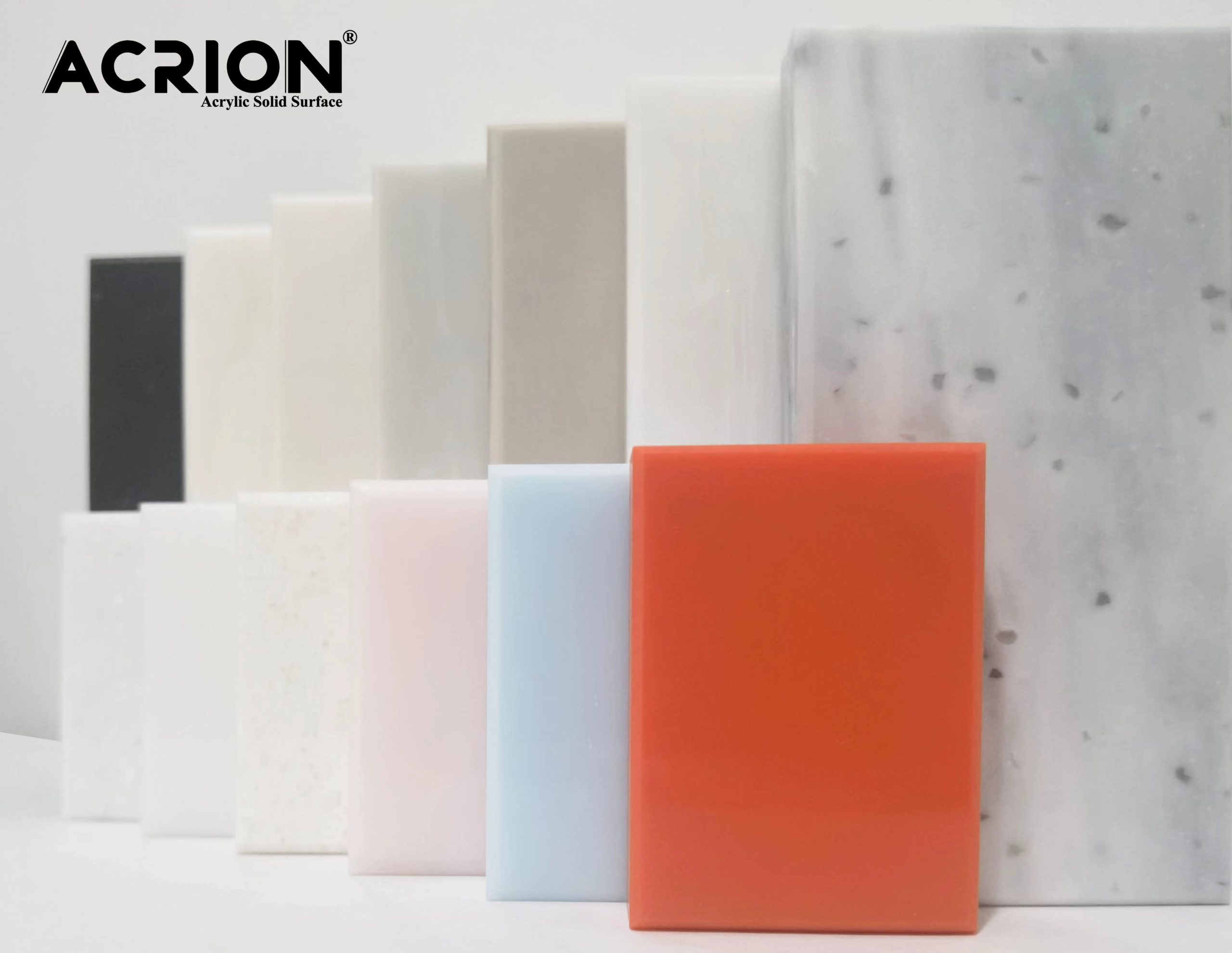The durability requirements of Kelinai school countertops need to be comprehensively considered in combination with factors such as high-frequency use in educational scenarios, environmental complexity, and maintenance costs. The following analysis is conducted from four dimensions: physical properties, chemical resistance, safety, and long-term maintenance:
First, the requirement for physical durability
Impact resistance and wear resistance
Demand scenarios: In students’ daily use, there may be situations such as stationery slipping, schoolbags being bumped, or equipment being moved. The countertop needs to withstand the impact without breaking.
Corine characteristics:
Impact resistance: The impact resistance of high-density acrylic material is three times that of ordinary stone. It can withstand the impact of a 3kg object falling from a height of 1 meter (simulating the drop of a schoolbag).
Wear resistance test: It has passed the Mohs hardness level 4 certification and can resist scratches from hard objects such as keys and compasses. There are no obvious scratches on the surface after long-term use.
Load-bearing capacity and stability
The countertop needs to support heavy objects such as books, computers, and laboratory equipment, and must ensure that it does not deform over long-term use.
Corine Solution:
Thickness selection: For regular classroom countertops, it is recommended to use a thickness of 12mm. For laboratories or computer rooms, a thickness of 25mm or more is needed, increasing the load-bearing capacity by 50%.
Support structure: It is matched with a steel frame or concrete base to distribute pressure and prevent the tabletop from bending due to excessive local force.
Second, the demand for chemical tolerance
Resistant to acid and alkali corrosion
Demand scenarios: Chemistry laboratories, art classrooms, etc., which may come into contact with acid and alkali reagents, pigments or solvents. The countertop needs to be protected from corrosion.
Corine test data:
Acid resistance: It can withstand immersion in 10% hydrochloric acid solution for 24 hours without surface discoloration or corrosion.
Alkali resistance: It can withstand immersion in 10% sodium hydroxide solution for 24 hours with stable performance.
Solvent resistance: It can be wiped clean with organic solvents such as acetone and alcohol without residue or dissolution.
High-temperature resistance performance
Demand scenario: Laboratory heating equipment or placement of high-temperature items. It is necessary to avoid deformation of the countertop or the release of harmful substances.
Corine characteristics:
Short-term temperature resistance: It can withstand a high temperature of 180℃ (such as when a hot container is placed for 10 minutes) without discoloration or cracking.
Long-term temperature resistance: It is recommended that the long-term operating temperature does not exceed 80℃ to prevent material aging.
Third, safety and ergonomic requirements
Edge protection
Demand scenario: Students are frequently active, so the edges of the countertop need to be protected from bumps and injuries.
Corine Design
Arc chamfer: The edge is processed with a rounded corner of R5-R10mm to reduce the risk of collision.
Anti-collision strips: Rubber anti-collision strips can be optionally equipped to further enhance safety.
Anti-slip and comfort
The countertop needs to prevent items from sliding off while ensuring the comfort of students during long-term use.
Corine Solution:
Surface treatment: The matte surface can increase friction and reduce the slipping of stationery or laboratory equipment.
Highly compatible: With adjustable desk legs (adjustable from 60 to 75cm), it is suitable for students of different age groups.
Fourth, long-term maintenance and cost requirements
Easy to clean and repair
Demand scenario: School countertops need to be cleaned quickly and maintained at low cost.
Advantages of Kelinai:
Cleaning efficiency: Stains can still be easily wiped off after 24 hours, and the cleaning time is 40% less than that of traditional stone.
Repair cost: Minor scratches can be repaired by grinding with 400-2000 mesh sandpaper, and the cost of a single repair is approximately 50-100 yuan.
Weather resistance and service life
Demand scenario: School countertops need to be used for a long time to avoid frequent replacement.
Corine Data:
Service life: Under normal use, it can reach over 15 years, which is 5 to 8 years longer than that of traditional wood or laminated boards.
Warranty commitment: We offer a 10-year warranty covering quality issues such as cracking and discoloration.
Fifth, a guide to avoiding pitfalls
Thickness selection:
Avoid choosing overly thin countertops (such as less than 8mm) to save costs, as it may lead to insufficient load-bearing capacity or cracking.
Installation requirements:
Installation by a professional team is required to ensure that the levelness error of the countertop is ≤0.5mm, and to prevent equipment shaking or countertop tilting.
Accessory matching:
It is equipped with waterproof rubber strips and anti-collision corners to further enhance durability and safety.
Sixth, Summary
Basic requirements: Select a 12mm thick, matte surface countertop, suitable for ordinary classrooms or administrative office scenarios.
Advanced requirements: Select a 25mm thick countertop with acid and alkali resistant coating, suitable for laboratory or high-load usage scenarios.
Health requirements: Give priority to obtaining environmentally friendly certified products (such as Greenguard Gold) to ensure students’ health.
Based on the above analysis, schools can select the appropriate specifications and configurations of Kelinai countertops according to specific scenarios, achieving a balance between durability, safety and maintenance costs.
